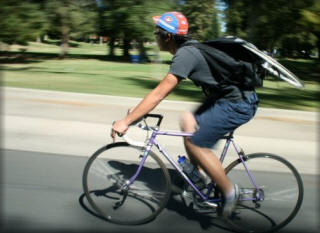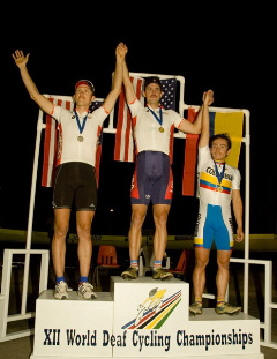
Satapana
Buthken on his Awesome Bike!
Deaf Cycling:
By Satapana Buthken
12/1/2008
I've always enjoyed going fast. It was something that made me feel free, something that took my mind off of things. Most of the time, going fast for me was in a car. When you are at high speeds you focus all of your senses on one thing, being in full control of your vehicle. A couple of semesters ago, I started working in the Air Quality industry for the state. It was focused on cutting down automotive emissions with smog regulations. This transformed me into a different person, a person who was more environmentally conscious, a person who cared more about doing my part for society. From that, and the influence from other engineers at my work, going fast for me was now on a bicycle. My bikes were a lot cheaper as a hobby than my car ever was. I've always had a thing for getting my hands dirty and tearing mechanical things apart, so the bicycle was right up my alley. From that point forward, I've been riding and fixing bikes ever since.
I googled "deaf culture cycling" and google spat out tons of links (some were useful, most were irrelevant such as "Naked Deaf Man on a Bike", definitely related to deaf and cycling but definitely uncalled for). The most important search result was the first link, which directed me to the United States Deaf Cycling Association.
Here is the sign for a bicycle, bike, or riding a bike:
My initial reaction was, "dang! these guys have an association? that's awesome!!!" (that was my exact reaction).
Before I go any further let us go over the sign for a bicycle/cycling.
(Used with permission from lifeprint.com)
Which is pretty much two fists, knuckles out doing a crank motion of a bicycle.
he USDCA site was pretty much the gate to everything else related to the deaf community and cycling for me, but the most important thing of their site for me was their by-laws, where they stated their goals for this association. In their bylaws, article 2 states their objectives which includes:Sec 1: To promote cycling, both recreational and competitive, among deaf and hearing impaired people.
Sec 2: To provide deaf cyclists with benefits, activities and opportunities which will further increase their enjoyment of the sport of cycling.
Sec 3: To encourage amateur bike racing among deaf cyclists and to sponsor national and regional races for the deaf cyclists, with sanction by and in conformance with the rules of appropriate agencies governing national and international cycling competition.
Sec 4: To assist in any way possible the selection, organization and training of the United States Deaf Cycling teams for international competition.
All of these goals were awesome and something I am definitely on-board with. Whatever promotes more people to get on a bicycle and ride is definitely something worth while
The Greatest Week in Deaf Cycling History!!!
So apparently I missed the greatest week in deaf cycling history. It looks like I missed it by about 2 years, which is really disappointing because if I had known about it I definitely would have been there to witness "the greatest week in deaf cycling history" because it was so local (in San Francisco and San Jose area). Looking at the reviews and the summary of all the races now, it was a major part of history; 12 nations were represented by 50 riders in both the Road and Mountain bike areas.
The picture above is of three cyclists who can out-sprint me anytime of the week. They are the top three (out of 32 riders) who finished 1000m sprint. They are three people standing on the podium because they have two main things in common. First is that they are cyclist (awesome cyclists) and second because they are deaf.
The second race I was thrilled to read about was the 120km. "The WDCC website has long said this race is the toughest road race in Deaf cycling history, and many riders after the race agreed enthusiastically!" When I checked the map and the elevation change of the course, I think I almost fainted. I can't even dream of climbing up a hill like that after 70 miles of intense riding (I don't think I can even ride 70 miles intensely, or 70 miles at all)!
The World Deaf Cycling Championship is definitely something I wish I was there to enjoy. Hopefully there will be another one soon that is local.I ran across a very inspiring video of Robin Horwitz from the Riding for Deaf Schools website.
Riding for Deaf Schools was a one day bike ride on Oct 19th to raise funding for schools for the deaf in the United States. Another disappointing find for me because I found out about this too late; this was something I would love to participate in.
I watched the video and thought, "man this Robin guy is awesome", so I proceeded to google and found other things about Robin Horwitz. According to Cycling News, Mr. Horwitz is a graduate from Gallaudet University and is the Director and Owner of Hawk Relay Cycling Team, a team that has two cyclist who competed for the United States at the 2008 Beijing Olympics. They are sponsored by Hawk Relay, a company that created a video relay system to assist with telecommunication for deaf and hard of hearing people. According to the peaks coaching group, he also owns Threshold Power, Inc. which "which hosts training camps in partnership with Hunter Allen and Peaks Coaching, Inc and is designed for cyclists of all stripes who want to learn how to incorporate power meters in their training." He is a USACycling-certified coach and is also the supervisor of Hellyer Park Velodrome in San Jose, helping to teach beginners on Saturdays about track racing (I attended one of those sessions over the summer, it was a blast!). So to sum it all up, Robin Horwitz loves speed (he started out as a race car driver!!), cycling, and track racing and is really successful in something he loves (all of the things that I love). He is officially my new hero. I hope I'm able to contact him and meet him someday, since he lives a couple of hours away in the Bay Area.
Picture credits:
USDCA (2008) Official logo of the United States Deaf Cycling Association. Retrieved December 2008 from: http://www.usdeafcycling.org/us-logo1.gifUDSF (2008) USA Deaf Sports Federation website: 2006 cycling world
championship webpage: http://www.usdeafsports.org/2006cycling/podium.jpg
